After Daughter's Death, Mom Creates Carefarm — with Rescued Animals — to Help Others Suffering from Loss
"We're capable of feeling everything at once, and when we allow ourselves to do that, we expand who we are," Joanne Cacciatore tells PEOPLE in this week's issue
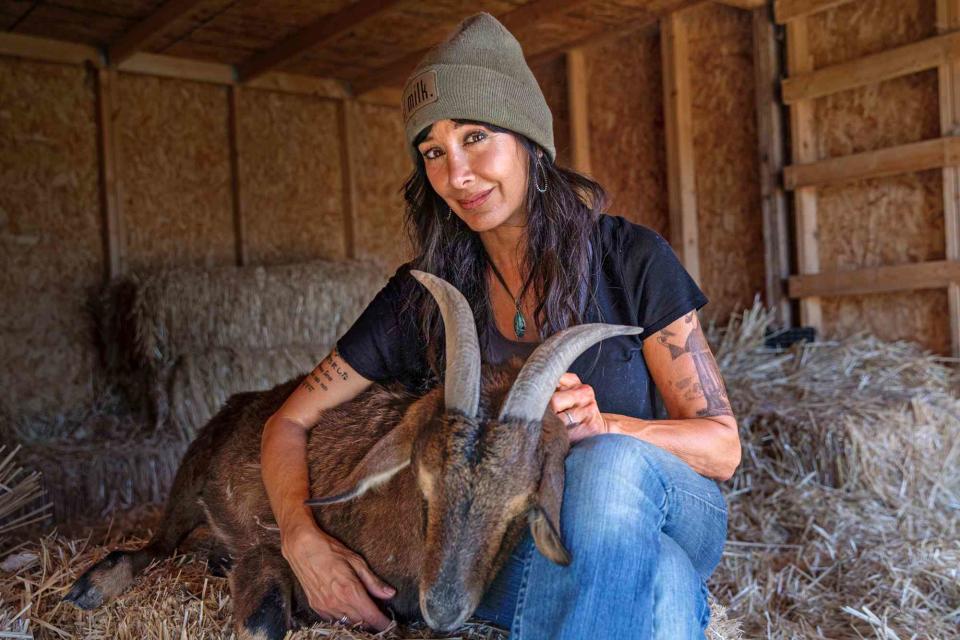
Adriana Zehbrauskas for The New York Times
Dr. Joanne Cacciatore, founder of the MISS Foundation and the Selah Carefarm at the farm's barn with rescue goats Kurt and Martha.When the nightmare that transformed her life began, Joanne Cacciatore was lying in a Phoenix hospital bed, excited to catch her first glimpse of her newborn baby girl. But in seconds her joy vanished. "She died at birth," recalls Cacciatore, still shaken by the memory of that July 1994 day. "I can't even begin to describe what it felt like."
The weeks and months that followed were agonizing for the then-29-year-old mother of three, who turned to counselors for help but admits she ended up feeling worse after her therapy sessions. "I wasn't sleeping," she tells PEOPLE in this week's issue. "And I couldn't eat because it felt like I had a grapefruit stuck in my throat. I descended into a pretty dark place."
Yet in the midst of her despair, Cacciatore decided that there had to be a better way to help grieving people like herself. So she enrolled in college for the first time and earned a Ph.D. in traumatic grief in 2007.
By 2016 she opened an innovative 12-acre sanctuary — known as the Selah Carefarm — outside Sedona, Ariz., where she has helped thousands of people whose lives have been upended by the violent or traumatic death of a loved one.
Through a combination of grief counseling and activities like gardening, yoga and time spent with the dozens of rescued goats, horses and dogs at the farm, Cacciatore says, the goal isn't to make her people feel better-it's to help them just feel.
"Grief is made up of countless little emotions that we've been taught are bad: anger, despair, rage, sorrow and confusion," says Cacciatore, 57, now an Arizona State University professor and mother of five, who divides her time at the farm with teaching and research work. "If you can let yourself truly feel your grief, if you can fully inhabit it, you can be transfigured by its incredible energy. It's a tragic gift that they [the dead] leave behind if we allow ourselves to access it."
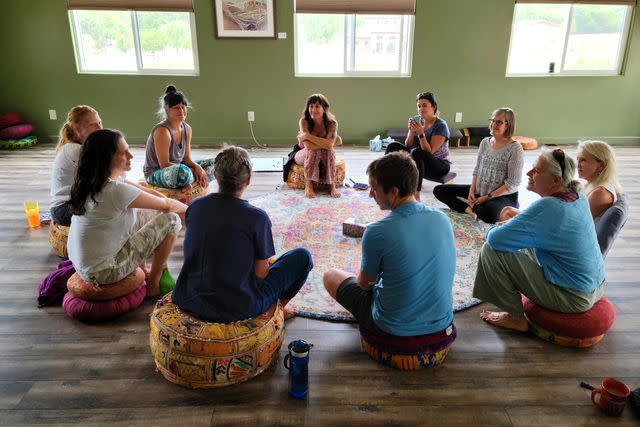
Courtesy Selah Carefarm
Selah Carefarm, a therapeutic place for people who suffered the loss of a family member., was founded by Dr. Joanne Cacciatore.The idea behind Cacciatore's pastoral haven took shape in 2015 when she rescued an abused, starving horse during a hike and brought him back to her property.
Not long afterward, one of her counseling clients — a Native American woman whose child had recently died — asked if she could go sit with the emaciated animal.
"I left her alone with the horse, Chemakoh, and went back to my office. A few minutes later I heard her wailing and sobbing, which is something she never did with me," says Cacciatore. "She had her hands on Chemakoh's neck, and he had his head bowed down to her. My first thought was, 'He's a much better counselor than me.'"
As Cacciatore incorporated additional rescue animals into her counseling work, increasing numbers of people began reaching out for help.
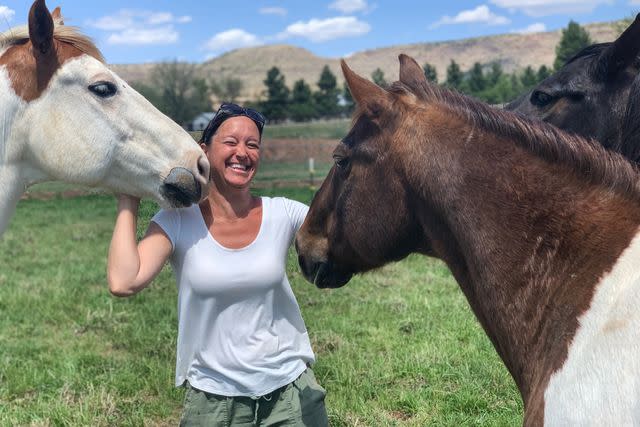
Courtesy Selah Carefarm
Selah Carefarm near Sedona, AZ."When these grievers are crying," she says, "the animals just come up, sit beside them and put their head on their lap. It becomes a relationship between two beings who have looked death and suffering in the eye and see each other."
Word has been spreading-thanks in part to her bestselling 2017 book Bearing the Unbearable and an appearance on Oprah Winfrey and Prince Harry's 2021 Apple TV+ series The Me You Can't See.
For more on the Selah Carefarm, pick up the latest issue of PEOPLE, on newsstands Friday, or subscribe here.
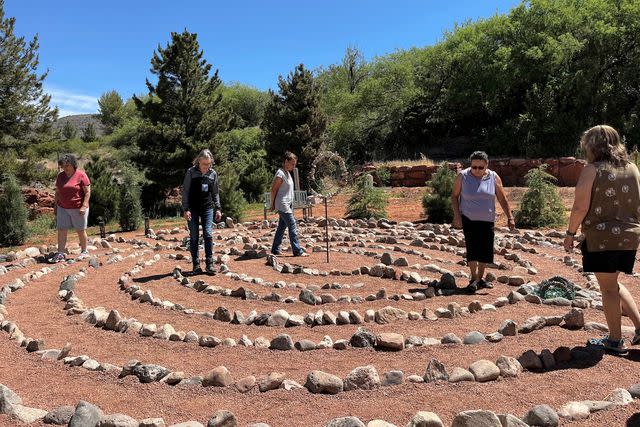
Courtesy Selah Carefarm
Bereaved parents walking the Sento il Sol Labyrinth.Today Cacciatore — along with five fellow grief counselors, three farmhands and a "human-animal connection specialist" — are busy working with those struggling with the murder, suicide or death of a loved one. "The majority have lost a child," she says.
Some come for the day; others stay for weeks. (Visits start at $300, and scholarships are available for people in serious financial need.)
"It's hard to describe how horrific it was," says Dorothy Green, of Phoenix, who first traveled to the Carefarm with daughter Sierra Aranda in 2019, five months after Green's 22-year-old son Andrew was killed, beaten to death with a hammer wielded by his husband. "The humans and the animals there just understand and give you the freedom to grieve and navigate this journey that none of us wanted to be on."
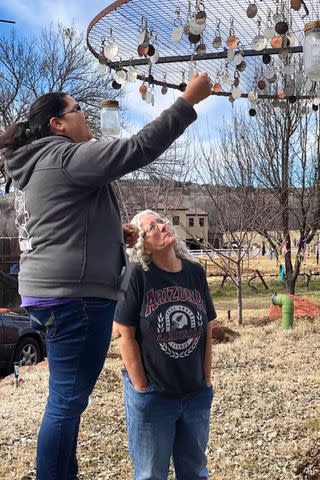
Courtesy Dorothy Green
Dorothy Green and her surviving children Sierra and Shane Aranda, visited the Selah Carefarm.The family now visit the farm several times a year, and in 2021 they built a small memorial garden where they placed some of Andrew's ashes. Says Aranda: "It's where I feel the closest to my brother."
Selah Carefarm is purposefully designed to bring comfort. It features an artesian spring flowing through the peaceful landscape and a mango tree with strips of cloth-cut from favorite shirts and pillowcases belonging to those who have died-tied to the branches.
"This is holy ground," Cacciatore says. "We just do grief here. That's why we refer to our counselors as 'grief counselors' instead of 'therapists.""
Sharon Tuggle, an Arizona-based businesswoman, began visiting the property in 2019 after the deaths of numerous family members. "I had so much sadness and was pretty numb," she says. "But Joanne prods you in such a gentle way that I could finally feel the sadness that had been suffocating me."
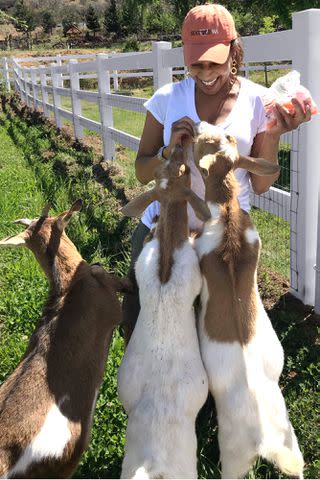
Courtesy Sharon Tuggle
Sharon Tuggle visited Silah Carefarm after loosing several family members including her sister.In the days ahead Cacciatore is determined to spread the Carefarm philosophy across the nation (a counselor she trained recently opened a similar sanctuary near Knoxville, Tenn.) while giving brokenhearted people a safe place to explore their emotions.
"It's possible to feel grief, sadness, anguish and sorrow while feeling joy and fulfillment," says Cacciatore, who notes that her stillborn baby would have turned 29 this month. "That's one of the great lessons my daughter has given me. We're capable of feeling everything at once, and when we allow ourselves to do that, we expand who we are."
For more People news, make sure to sign up for our newsletter!
Read the original article on People.

 Yahoo News
Yahoo News 
